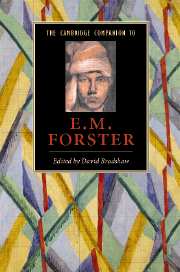Book contents
- Frontmatter
- Introduction
- 1 Forster’s life and life-writing
- 2 Bloomsbury and other values
- 3 Forster and England
- 4 Hellenism and the lure of Italy
- 5 Forster and the short story
- 6 Forster and the novel
- 7 Forsterian sexuality
- 8 Forster and women
- 9 A Room with a View
- 10 Howards End
- 11 Maurice
- 12 A Passage to India
- 13 Forster and modernism
- 14 Forster as literary critic
- 15 Filmed Forster
- 16 Postcolonial Forster
- Further reading
- Index
- Series List
16 - Postcolonial Forster
Published online by Cambridge University Press: 28 September 2007
- Frontmatter
- Introduction
- 1 Forster’s life and life-writing
- 2 Bloomsbury and other values
- 3 Forster and England
- 4 Hellenism and the lure of Italy
- 5 Forster and the short story
- 6 Forster and the novel
- 7 Forsterian sexuality
- 8 Forster and women
- 9 A Room with a View
- 10 Howards End
- 11 Maurice
- 12 A Passage to India
- 13 Forster and modernism
- 14 Forster as literary critic
- 15 Filmed Forster
- 16 Postcolonial Forster
- Further reading
- Index
- Series List
Summary
Following his third and final visit to India during the last three months of 1945, Forster reflected on the increasing politicisation he had found among the educated class of a country which was on the brink of winning independence from Britain. This change appears to be behind an undercurrent of regret that runs through his essay, 'India Again', subsequently incorporated into Two Cheers for Democracy. Yet although the Indians he met on this trip were more interested in discussing politics than art for its own sake as Forster would have preferred, nevertheless he comments that beneath this educated crust:
externally India has not changed. And this changelessness in her is called by some observers 'the real India'. I don't myself like the phrase 'the real India'. I suspect it. It always makes me prick up my ears. But you can use it if you want to, either for the changes in her or the unchanged. 'Real' is at the service of all schools of thought.
In this statement Forster acknowledges that notions of what makes for the 'authentic' India (and authentic Indians) are sites of political controversy. He also demonstrates his own acute consciousness of the pitfalls of the tradition of writing and thinking about India of which his most famous novel, A Passage to India, is a part. If Passage is the great anti-colonial statement in English fiction of the first half of the twentieth century, and Forster the great debunker of imperial pomposity, then we can gain a stronger sense of his unfolding relationship with India, of which the novel records only a fragment, by paying attention to some of his other utterances on India.
- Type
- Chapter
- Information
- The Cambridge Companion to E. M. Forster , pp. 254 - 273Publisher: Cambridge University PressPrint publication year: 2007
- 1
- Cited by

